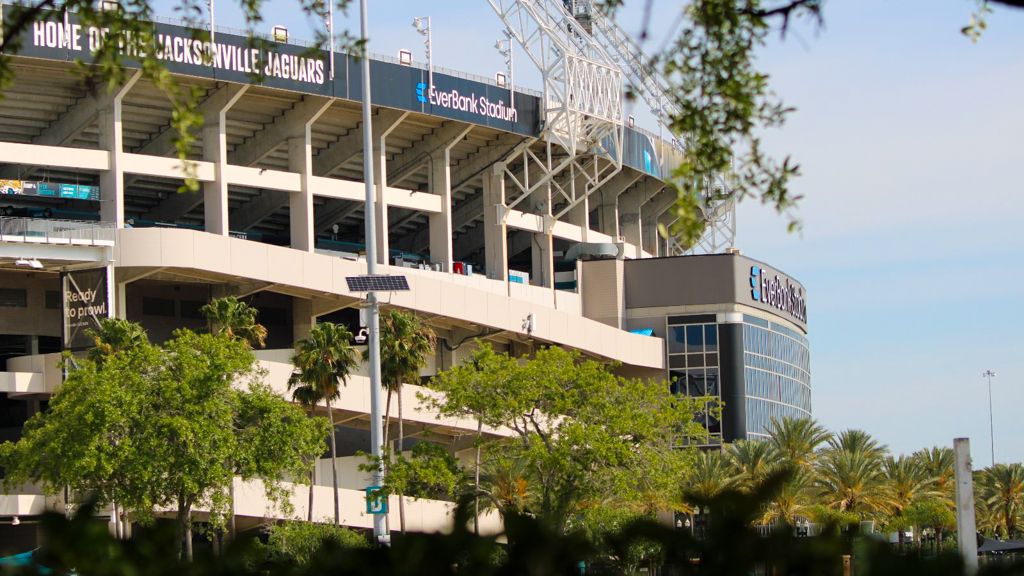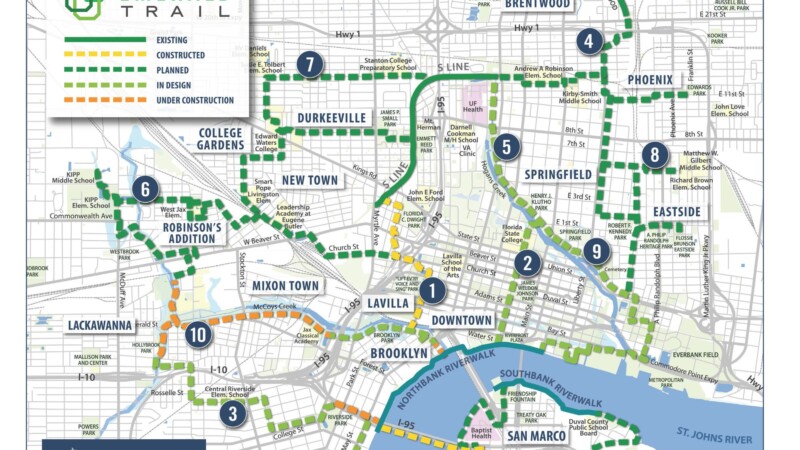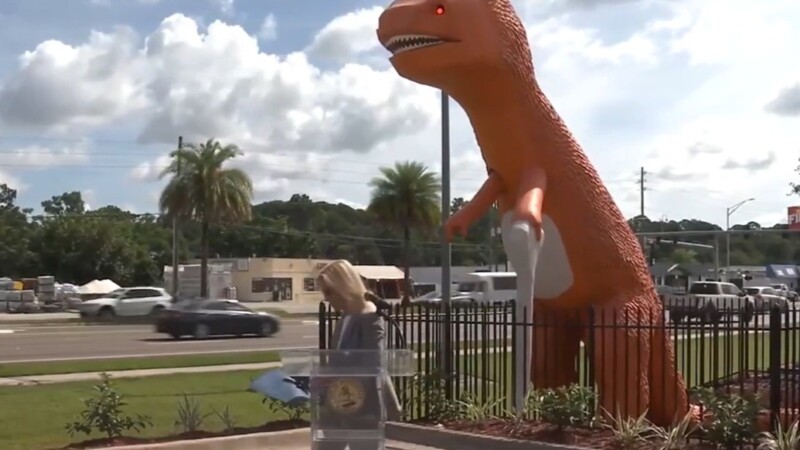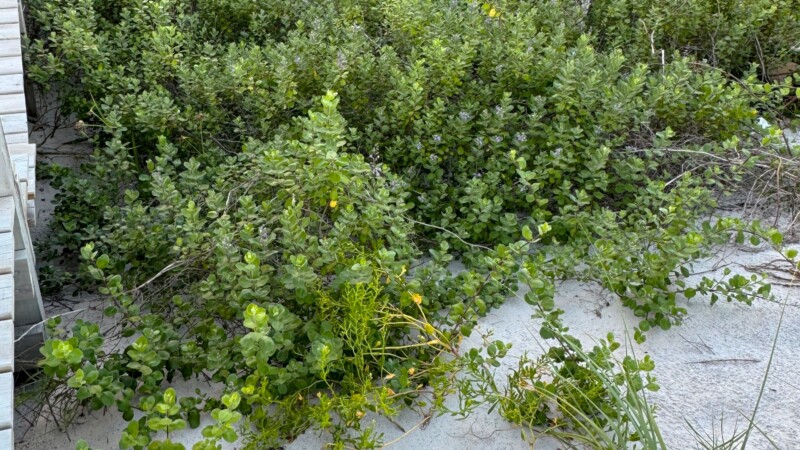Q: Last June, the city of Jacksonville and the Jaguars began negotiations on what the Jags have dubbed “The Stadium of the Future” – an extensive, top-down remodel of the stadium that is estimated to cost $1.4 billion. The City Council is expected to see results of those discussions around the third week in May. So far, details of the plan remain hazy for the general public.
While the cost split of the massive project has been top of mind among the City Hall set, Jacksonville Today reader Maureen O. is pondering a different kind of green. She asks whether resiliency to climate change will be considered in the potential rebuild of the stadium.
Will there be any thought at all to climate change?
For example, Maureen asks whether it’s too late to consider powering the “Stadium of the Future” with solar energy (as Las Vegas’ Allegiant Stadium was during Super Bowl 2024).
A: The City Council recently approved spending $10 million on design and engineering work for the stadium, so final blueprints are a long way off. But both the Jaguars and the city have publicly pledged to include green initiatives and resiliency efforts into their agreement to remodel the stadium.
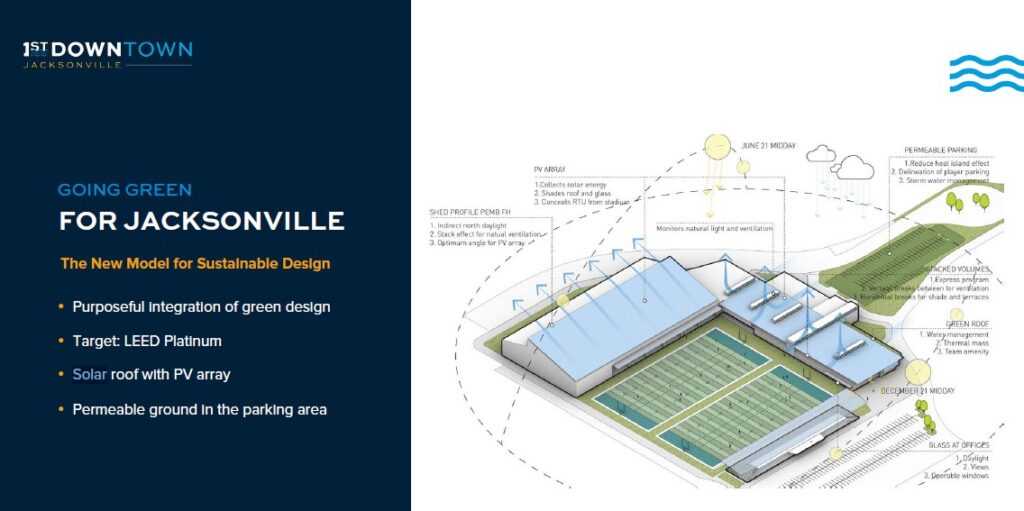
in a proposed remodel. | 1stdowntownjacksonville.com
When the Jags published their initial proposal in June of 2021 , titled “Forward Progress for Downtown” it included a slide on “going green,” including “purposeful integration of green design,” like a solar roof with a photovoltaic array — meaning it can produce solar electricity. The larger the amount of surface area in the array, or solar paneling, the more electricity it can generate.
The Jags also state in the document that the team has a “LEED Platinum” target, the highest tier on the green-building rating system created by the U.S. Green Building Council. LEED certification considers choices about energy use, water use, environmental quality and materials in construction.
Generally speaking, the proposed remodel would represent an upgrade for the stadium’s sustainability , says Jaguars spokesperson Lyndsay Rossman.
“The Stadium of the Future would be a major transformation of the existing stadium while effectively using as much of the existing structure as appropriate, providing a more environmentally friendly and cost-effective approach than abandoning the current stadium,” Rossman says in an email to Jacksonville Today. “The single most sustainable strategy is to adapt as much of the existing structure as appropriate, effectively reducing resource usage and minimizing the carbon footprint of new construction.”
Rossman adds that new landscaping of stadium grounds could minimize the heat island effect, and using native plants would reduce stormwater runoff and improve water quality by replicating the natural hydrology and water balance of the site.
“Additionally, the stadium grounds would double as a public park, year-round, on non-event days,” Rossman says, “contributing to community health and wellbeing.”
She also says the exterior would be designed to minimize utility needs and cost, provide passive cooling, shading and natural ventilation for athletes and fans, while equipment and fixtures would be upgraded with enhancements to improve energy performance.
As for the city’s part, the mayor last fall released the city’s first long-term plan for a resilient future.
“Resilient Jacksonville,” Jacksonville’s newly adopted long term resiliency strategy, is the master plan unveiled last fall by Mayor Donna Deegan and the city’s chief resilience officer Anne Coglianese. While the municipal stadium is not specifically mentioned, Atlanta’s Mercedes-Benz Stadium is mentioned in the document as a case study.
“Located in a flood-prone area of Atlanta, Georgia, Mercedes-Benz Stadium… The 75,000-seat stadium site includes water retention, energy conservation, alternative transportation, urban gardens and agriculture programs that contribute to its exemplary resilience and sustainability efforts,” the Jacksonville document states. “Located near Proctor Creek, the stadium sought to reduce its impact on local flooding issues. The project includes a 2-million-gallon stormwater capture and storage system, as well as a 680,000-gallon cistern for rainwater recapture and reuse that is used for landscape irrigation and the site’s cooling tower and can hold 80% of the site’s rainwater during a 100-year storm.”
With that document, Jacksonville and its mayor have committed to making sure that steps are taken to ensure any reconstruction of the stadium takes resiliency and resources to heart. The city aims to look at the development of individual neighborhoods as a unit, as well as tailor resiliency needs for site-specific development, according to the document.
“Resilient Jacksonville” also mentions how the solar array has worked for the Falcons’ home base.
“By constructing 700 (kilowatts) of solar (photovoltaic) carport arrays,” the document states, “Shade is provided for fans and enough renewable energy is produced to power nine Atlanta Falcons games.”
Have a question you’d like the Jacksonville Today team to look into? Email news@jaxtoday.org with #AskJAXTDY in the subject line.

Casmira Harrison is a Jacksonville Today reporter focusing on local government in Duval County.


